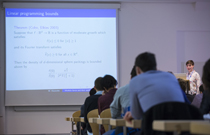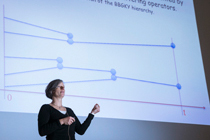
What is the concept behind MATH+ Fridays?
The Friday colloquia represent a common meeting point for Berlin mathematics: a colloquium with broad emanation that permits an overview of large-scale connections and insights. In thematic series, the conversation is about “mathematics as a whole,” and we hope to be able to witness some breakthroughs. Hardly anyone knows that Grigory Perelman first presented his famous proof of the Poincaré Conjecture to the mathematical public in Berlin, at the PhD student seminar meeting of professors Huisken and Ecker at FU Berlin.Behind the scenes at MATH+ Fridays, a number of seminars, workshops, courses, and conversation opportunities are on offer. For instance, the lunches prior to the “Sophia Kovalevskaya Colloquia” are a place to discuss the career paths of successful women in mathematics. Seminars and courses that BMS students can request will discuss such topics as presentation training, good scientific practice, time management and science communication.
All MATH+ Friday speakers receive the "Friday wish list" written by BMS students before their talk.
MATH+ Fridays in the winter semester 2025/26
|
24 October 2025 |
Florian Frick |
Topology meets discrete geometry: Proximity and incompressibility |
@TU (MA 042) |
|
7 November 2025 |
Gabriele Steidl (TU Berlin) |
Adapting Noise to Data: Generative Flows from 1D Processes |
@TU (MA 042) |
| 21 November 2025 | Tamás Hausel (ISTA) |
Anatomy of big algebras | @TU (MA 042) |
| 5 December 2025 |
Julia Böttcher |
Randomness, quasirandomness, and decomposition problems | @TU (MA 042) |
| 12 December 2025 |
Barbara Niethammer |
The classical coagulation equation: gelation, self-similarity and oscillations & Christmas Party |
@FU (T9) |
| 16 January 2026 |
|
||
| 30 January 2026 |
Alexei Skorobogatov (Imperial College London) |
Rational points on surfaces | @HU ESZ, R. 0'119 |
On the importance of MATH+ Friday colloquia (written by a BMS student for BMS students)
What makes a good mathematician? To speak in broad generalities, one needs to have a strong mathematical apparatus and a bold vision. It is certain that reproducing elegant proofs and solving problems ensures the development of a mathematical apparatus. On the other hand, shaping a bold vision is a rather subtle matter. In general, a starting point for the development of a bold vision could be a colloquium talk. A talk, which showcases fascinating research results as well as current trends in Mathematics, could stimulate the emergence of new ideas. More specifically, it could be said that such talks leave ”traces” in the brain, which accumulate over time. Just like the effect of a talk is intangible, there is probably no universal measure for the degree of understanding. Certainly, if a talk happens to be very closely related to a person’s specialisation, then more details could be followed, and hence, something similar to the standard measure can be used. However, it would perhaps be too restrictive to say that a talk is understood only if most details are clear. Even an attempt to follow the main story line exposes a person to a fresh perspective. And this could potentially become the source of inspiration. Moreover, such colloquia contribute to our perception of Mathematics in its entirety by offering the chance to think about analogies in different areas.
























